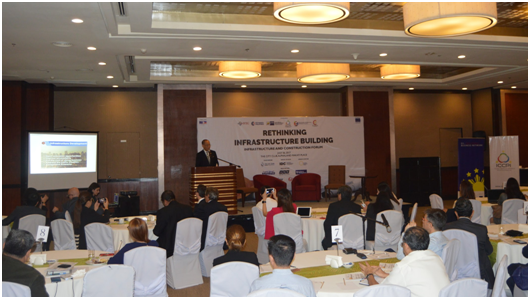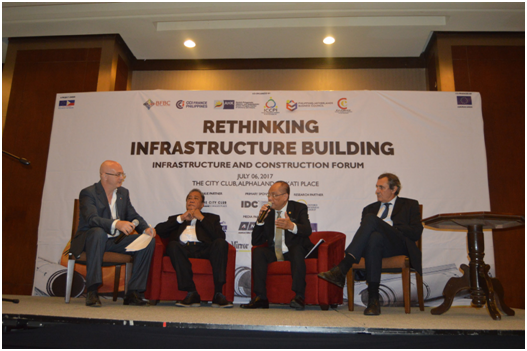
In photo, left to right: Mr. Lorens Ziller, Executive Director of the Italian Chamber of Commerce in the Philippines; DOTr Secretary Arthur Tugade; DBM Secretary Benjamin E. Diokno; and Mr. Enrico Strampelli, Head of Development Section of the Delegation of the European Union to the Philippines.


Department of Budget and Management Secretary Benjamin E. Diokno presented to the officials and member of the European Union-Philippines Business Network the socioeconomic agenda and infrastructure and transportation program of the Duterte administration in the forum “Rethinking Infrastructure Building,” held on July 6, 2017, in Makati City.
Department of Budget and Management (DBM) Secretary Benjamin E. Diokno, along with Department of Transportation (DOTr) Secretary Arthur Tugade, presented to the officials and members of the European Union – Philippines Business Network (EPBN) the socioeconomic agenda and the ambitious infrastructure and transportation program of the Duterte administration in a forum held yesterday, July 6, in Makati City.
Entitled “Rethinking Infrastructure Building,” the forum gathered officials, representatives, and members of various chambers and organizations of the European business community in the Philippines, including the Belgian-Filipino Business Community (BFBC), French Chamber of Commerce in the Philippines (CCI France-Philippines), German-Philippine Chamber of Commerce and Industry (GPCCI), Italian Chamber of Commerce in the Philippines (ICCI), the Philippines-Netherlands Business Council (PNBC), and the Spanish Chamber of Commerce in the Philippines (La Camara). Also present in the audience were representatives from local and international companies mainly from the construction industry.
In his keynote address, Sec. Diokno presented some of the goals of the Duterte administration, which are to achieve economic growth of 6.5-7.5% this year, and 7-8% in the following years, as well as to reduce poverty to 14% by 2022, or at the end of President Duterte’s term. The government’s numerous programs and projects are aimed at inclusive growth and catching up with the country’s ASEAN-5 neighbors, according to the Budget chief.
The secretary also discussed the role of infrastructure development in the socioeconomic agenda of the Duterte administration, explaining the rationale for the heavy investments for “Build, Build, Build,” the government’s national infrastructure program.
“Infrastructure will open up numerous economic opportunities given the improved accessibility between cities, regions, and provinces,” said Sec. Diokno.
He added that good public infrastructure will minimize the cost of doing business and attract entrepreneurs to invest their money in the Philippines, making the country’s economy highly competitive.
The Budget chief also emphasized that “Build, Build, Build” solves two problems: the government decongests Metro Manila while at the same time directing economic activity towards less developed regions in the Philippines.
“Sometimes, it only takes a bridge or a highway to revitalize a local economy – say tourism or trade in the far-flung areas of the country that have untapped potential,” said Sec. Diokno.
The Budget secretary also took the opportunity to report some of the projects in line, including the 581-km PNR South Long Haul, which will connect seaports and run through several provinces and cities (Laguna, Batangas, Quezon, Camarines Sur, Albay, and Sorsogon); the 25-km Mega Manila Subway, which will reduce travel time from Quezon City to Taguig City to a half hour; and the 830-km Mindanao Logistics Infrastructure Network (M-LIN), which will improve the agribusiness industry in Mindanao by connecting Northern Mindanao, Davao, CARAGA, and Soccsksargen.[1]
Sec. Diokno added that recognizing previous roadblocks to national development such as underspending, corruption, and low absorptive capacity, the Duterte administration is working out policy reforms that will improve processes and transparency in government.
“From [DBM's] end, we have installed numerous measures to streamline processes and expedite project implementation without sacrificing transparency and accountability,” said Sec. Diokno.
As an example, the Budget chief stressed that only “shovel-ready” projects will be included in the national budget, in order to avoid delays and underspending. Modern technology, such as geo-tagging, will be used to monitor projects and eradicate “ghost projects.” The Budget Treasury Management System (BTMS), on the other hand, will help the government track agencies which are slow in disbursing their budget. The DBM has also issued the revised Implementing Rules and Regulations (IRR) of the Government Procurement Reform Act (RA 9184), which will assist government agencies in fast-tracking the procurement process.
In closing his presentation, Sec. Diokno expressed his confidence that the private sector will be fully supportive of the government’s infrastructure and transportation program and invited the European business community to join in the government’s aggressive efforts in making the Philippines “safer, fairer, more prosperous, and more dynamic.”
For the complete transcript of Sec. Diokno’s presentation to the European Union – Philippines Business Network, visit http://www.dbm.gov.ph/?page_id=20933. For more information, visit www.dbm.gov. For regular updates, follow the official Facebook and Twitter account of DBM: @DBMgovph.
[1] Visit http://www.build.gov.ph/ for more information.

